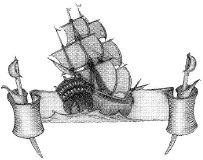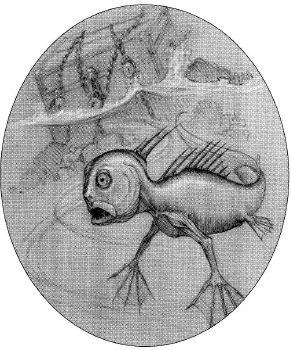Peter and the Starcatchers (25 page)
Read Peter and the Starcatchers Online
Authors: Dave Barry,Ridley Pearson
Tags: #Juvenile Fiction, #Fiction, #General, #Family, #Social Science, #Fantasy, #Action & Adventure, #Magic, #Friendship, #Pirates, #Juvenile Nonfiction, #Orphans, #Nature & the Natural World, #Humorous Stories, #Orphans & Foster Homes, #Adventure and Adventurers, #Islands, #Folklore & Mythology, #Characters in Literature

Tubby Ted’s too tired even to talk,
James thought.
That’s one good thing come of all this.
As they walked, James regularly shouted for Alf, but there was no response. Every few minutes the boys stopped to rest, and James would try to cheer up the others. But more and more he saw hopelessness on their faces, as wel as growing exhaustion on Tubby Ted’s. More and more, James had to speak sternly to get them moving again.
He struggled to stay calm, but, as he stumbled forward through the clinging vines, the fears were multiplying in his mind: what if they were stil lost when night fel ? It was dark enough now, but…he shuddered at the thought of being surrounded by this jungle in pitch blackness.
“ALF!” he shouted, for the hundredth time, and for the hundredth time he got no answer.
“Al right, then,” he said, stopping again. “Let’s rest here for a bit.”
He turned reluctantly, not wanting to see the disheartened faces of the others, but feeling the burden of command.
I wish Peter were here.
Behind him, Prentiss and Thomas were sitting in a dense growth of low ferns on the jungle floor, their heads down. Tubby Ted was…
Tubby Ted wasn’t there.
“Ted?” said James. “TED! D’YOU HEAR ME? TED?”
Nothing.
“Wasn’t Ted right behind you?” James asked Thomas, fighting to keep the panic he was feeling out of his voice.
“He was, last I looked,” said Thomas.
“When was that?” said James.
“I dunno,” said Thomas. “A few minutes ago.”
“You didn’t hear anything?” said James.
“No,” said Thomas, sobbing now. “What if a goril a got him?”
That got Prentiss crying, too.
“Stop it, you two!” said James. “Now, listen. It wasn’t any goril a. Tubby Ted probably tripped and fel , is al . We have to go back and find him.”
“I don’t want to go back,” said Prentiss. “I just want to get out of here.”
“Me too,” said Thomas. “I’m not going back where there’s goril as.”
“There’s no goril as!” said James.
“You don’t know that,” said Thomas. “You don’t even know where we are. I’m not going back.”
“Me neither,” said Prentiss.
“Al right then,” said James. “Al right. You stay here. I’m going to go back just a few steps and have a look.”
“No!” said Prentiss. “You’l get lost!”
“I won’t,” said James. “I’l be careful. Just a few steps. Stay right here.
Don’t move,
you understand?” Prentiss and Thomas nodded. James edged past where they were sitting and pushed his way back in the direction they’d come from. He fol owed the broken leaves and branches, walking for perhaps a minute. Then he paused and shouted: “TED! TED! ANSWER ME, TED!” Nothing.
James looked back and cal ed: “PRENTISS! THOMAS! CAN YOU HEAR ME?”
“Yes!” The two voices were muted, but not far off.
James decided to backtrack a little farther.
Just a few more steps.
He pushed on a short distance, then shouted again.
“TED! TED, IT’S JAMES! CAN YOU HEAR ME? ANSWER ME!”
Nothing.
Not daring to venture any farther away from Prentiss and Thomas, James turned back. He trudged a few yards and shouted: “PRENTISS! THOMAS!” Nothing.
James’s spine went cold.
“PRENTISS! THOMAS! THAT’S NOT FUNNY! ANSWER ME!”
Nothing.
Now James was running, stumbling forward, shouting. In a minute he reached what he judged to be the place where he’d left them.
There was nobody there.
Maybe it’s the wrong place.
But it wasn’t the wrong place. He could see two flattened areas in the fern patch, where Prentiss and Thomas had sat. This was where they’d been.
“PRENTISS! THOMAS! ANSWER ME!”
Where had they gone?
Alone now, no longer trying to hide his fear, James whirled in circles, shouting, looking, shouting, looking, but seeing only the dark green blur of the jungle. Final y, exhausted, he dropped to his knees, then onto his stomach in the thick, soft ferns. Then he put his face in his hands and cried—big, chest-wracking sobs—until he couldn’t cry anymore.
He lay there, face in hands, trying to imagine that he could wish everything away, so that when he opened his eyes, it would al be gone—the pirates, the shipwreck, and especial y this awful jungle. Gone. Everything gone but his friends.
But when he opened his eyes, the jungle was stil there, surrounding him with its ominous, gloomy silence.
Now, as James’s eyes adjusted, as he raised his face from the ferns, he saw that there was something else, right there in front of him.
Two pairs of very large, very brown bare feet.

GETTING CLOSE
M
OLLY AND PETER FOUND IT TOUGH GOING; the lower they descended on the mountain slope, the denser the vegetation, until they almost felt as though they were swimming in it, rather than walking through it.
With visibility limited to only a few feet, and with no way to take their bearings, they couldn’t be sure if they were stil going in the right direction. As the mountain slope became more gentle, they had trouble determining which way was downhil . They found themselves stopping more and more, unsure which way to go.
“Let’s yel for them,” said Peter. “They can’t be far off now.”
“No yel ing,” Mol y said. “There are pirates about, and for al we know there may be others here as wel .”
“What others?” said Peter.
“I don’t know,” said Mol y. “But I’d prefer to find out about them before they find out about us.” And so, having determined—they hoped—which way was downward, they pushed on. Impossibly, the jungle grew even thicker; there were times when Peter, only two steps behind Mol y, could not see her. That was why, when he pushed through a particularly lush curtain of hanging moss, he bumped into her back.
“Oof,” he said. “Sorry. I…”
“Shhh,
” she said, putting her hand on his arm. “Listen.”
Peter listened. He heard nothing.
“What?” he whispered.
“I heard somebody shouting,” she said. “From that way.” She gestured in roughly the direction they’d been walking.
“Shouting what?” said Peter.
“I couldn’t make it out,” she said. “But it wasn’t a man’s voice. It was a
boy’s.
”
“That’s them!” said Peter. “H—”
He was stopped from shouting by Mol y’s hand clapped over his mouth.
“Shhh,
” she said, then removed her hand.
“But why?” whispered Peter.
“Because,” said Mol y, with exaggerated patience, “as we were discussing one minute ago,
there are pirates about.
”
“But they’re nowhere near
here,
” said Peter.
“You don’t know that,” said Mol y.
Peter, unable to think of a good answer, settled for looking annoyed.
“Al right, then,” said Mol y. “We’l go toward the shout, but we’l go quietly. Agreed?”
Peter said nothing. He wasn’t sure about taking orders from her.
“Good,” said Mol y, moving again.
“You worry too much,” Peter said to her back.
She stopped, turned and faced him, her index finger pressed to her lips. And then he, too, heard it: voices in the distance…
But speaking a language he’d never heard before.
Grunts
and…
clicks.
Whoever they were, they weren’t pirates.
Peter wasn’t sure they were human.

HEAVY LIKE A TRUNK
T
HE TOWERING MOUNTAIN OF ROCK AND JUNGLE, engulfed in soft white mist, rose before Stache’s vision like an altar.
“Beautiful, ain’t she?” Stache said, in a moment of uncharacteristic reverence. He jumped from the longboat into the now-gentler surf and trudged to the beach, his boots squishing wetly. Behind him, Smee and a dozen of Stache’s best men hopped out as wel , and dragged the longboat up onto the white sand.
Stache, fol owed by the others, strode quickly to the line of footprints he’d seen from the deck of the
Jolly Roger.
“Here they are,” he said. “Smee! What do you make of this?”
Smee came puffing up and examined the sand.
“Footprints,” he said.
“I
know
they’re footprints,” said Stache. “What’s
between
the footprints, Smee?”
“Ah,” said Smee, squinting. “Something’s been dragged.”
“Very good, Mr. Smee,” said Stache. “And how much does this something weigh?”
“Heavy,” said Smee.
“Yes, heavy.” Stache smiled, his twisted black moustache turning at the edges with the grin. “Heavy like a trunk.”
“A trunk!” said Smee. Then, after a pause, he said: “Say, Cap’n, wasn’t you
looking
for a trunk?”
“OF COURSE I AM, YOU SEAGULL-BRAINED CRETIN,” bel owed Stache. “THE TRUNK IS WHY WE’RE ON THIS BLEEDIN’ ISLAND!” Then, calming somewhat, he turned to the pirates and said, “Looks like we’l be taking a walk through the jungle, men.”
“It looks a might thick, don’t it, Cap’n?” asked one of the pirates, hesitantly. “Could be al manner of snakes in there, waitin’ to chomp on our legs.”
“An excel ent point,” said Stache. “That’s why
you
shal go first.”
The pirate’s face fel , but he dared not say any more.
“Now,” said Stache, looking at another of the men, and pointing to the footprints. “How many d’you figure?” The man dropped to one knee and studied the sand.
“A bit confusing, it is,” he said. “Might be two. Might be four. And”—he turned and pointed to the pirates’ prints in the sand—” “I’d say they ain’t half the weight of us, neither, Cap’n. Children, I’d say.”
“Children,” said Stache, his face darkening. “That cursed
boy.
”
“But, Cap’n,” Smee said, “I don’t see how…In that storm…”
“It’s HIM,” thundered Stache. “Him and that girl. They’re on this island.”
“Yes, Cap’n,” said Smee.
Stache pointed to the man he’d designated as snake bait.
“Get moving,” he said, pointing up the beach at the waiting jungle. “We’ve got a trunk to find. And a boy to kil .”


THE TRANSFORMATION
I
N THE LAGOON, THE FISH WERE STILL HOVERING. There were nine of them, al females, and for hours they had barely moved, other than to make smal, efficient motions with their bodies to counteract the ebb and flow of the wave-surge, and thus keep themselves bathed in the glowing, green-gold water.
